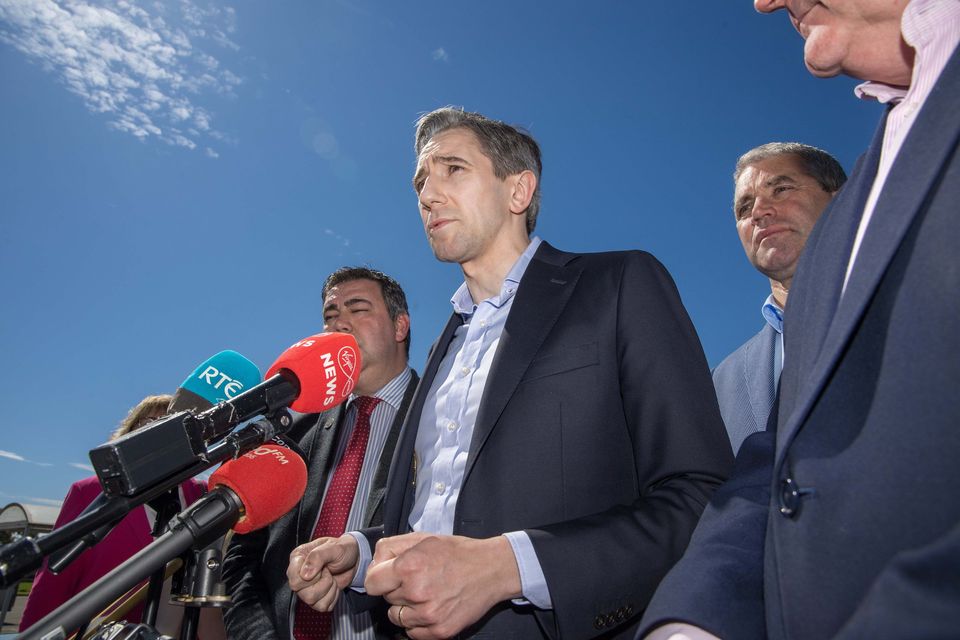Simon Harris says more accommodation will come ‘on stream’ soon after 30 tents erected along Grand Canal
Tents seen on the Grand Canal on Wilton Terrace
Taoiseach Simon Harris has said he is satisfied that more accommodation options, like those provided to people who were camped at Grand Canal in Dublin, will come “on stream” soon.
Speaking to the media at Corrine Mart in Fermoy, Co Cork, he said that Ireland is facing a challenging situation as large numbers of people come to the country while there is “constraints” on providing accommodation.
This comes as more tents were erected along the banks of the Grand Canal in Dublin overnight, less than 24 hours after an encampment was removed from the area.
About 30 tents have been pitched after asylum-seekers were moved to tented accommodation on State-owned sites yesterday.
Taoiseach Simon Harris with Fine Gael’s Cork County Councillors, local election candidates along with Ireland South European candidate John Mullins pictured at Corrin Mart, Co Cork. Pic Darragh Mc Sweeney/Provision
The tents have been set up between McCartney Bridge and Leeson Street Bridge.
“A lot of that will look like tents with sanitation on public sites, but a more safe environment for both a public health point of view and a legal point of view,” the Taoiseach said.
Mr Harris said that outside of accommodation, other options at the Government’s disposal are being examined so that a sustainable immigration policy can be put in place.
Amid some tensions, the Taoiseach said that it is important that the public is conscious that there are “very vulnerable” people coming to Ireland seeking protection.
He said that his government’s responsibility is showing that there is rules in place and that its system is “fair and firm”.
“Immigration has benefited this country, and it continues to benefit this country but people also want to know we have a rules-based system. They want to know when someone comes here that they can be processed quickly, that they can get a ‘yes’, if they get a ‘yes’ they can make a contribution to Irish society. But equally, if they get a ‘no’ the rules also work in relation to that,” the Taoiseach said.
Mr Harris said that there is no update regarding the government’s position on asylum seekers crossing into Ireland from the UK via Northern Ireland.
“The factual position now is that the Minister will bring forward legislation to regularise the agreement that is already in place,” the Taoiseach said.
He said the “most important thing” Ireland could do to successfully address immigration is have processing times which would ensure people get “clarity and certainty” in a swift manner.
Yesterday, a major effort got under way in the early hours to relocate 163 people to State-provided accommodation in Dublin. One of these sites was in Crooksling, with the other being the former Central Mental Hospital in Dundrum.
The makeshift encampment had developed along the Grand Canal following the removal of a “tent city” on Mount Street, near the International Protection Office. Barriers were set up to prevent further pitching of tents.
Within six hours of yesterday’s clearance, tents were erected in Ringsend and East Wall also.
Read more
Speaking at a press conference a short time after the clearance operation at the Grand Canal yesterday, Mr Harris said camps that developed would not be allowed to stay in place.
“Those days are gone. Those days are over. That’s not going to happen and the Government is absolutely united in relation to this,” the Taoiseach said.
Mr Harris insisted the barriers erected along the banks of the canal after the removal of tents were not a long-term plan.
“The multi-agency response involves a number of different actions happening. It doesn’t involve the long-term erection of barriers [to] parts of our city, but in the short term that can be a requirement.”
In the Dáil yesterday, Tánaiste Micheál Martin said the issue of tents would be dealt with “wherever they arise”.
“It’s not good for migrants, not good for asylum-seekers, nor for residents, or the general area. I think it’s just simply not acceptable,” Mr Martin said. “There is a plan resolutely to deal with tents wherever they arise.”
Public Expenditure Minister, Paschal Donohoe said the Government was processing more International Protection (IP) applications and that more emergency accommodation was needed for those seeking protection.
“In the short term, it's about the decision where we are putting more people into the parts of our Government to allow applications… to be handled more quickly,” he said on RTÉ’s Morning Ireland.
"We've doubled the resources, we've tripled the number of cases that are being processed. As we are doing that, we need to provide more emergency accommodation.”
Mr Donohoe said that while a plan was in place to establish 14,000 State-owned emergency accommodation beds and to introduce the EU migration pact, the response was happening while there were multiple wars in the world.
"I hope you have a large supply of fences, Tánaiste" - Jennifer Whitmore tells Micheál Martin as Grand Canal tents cleared
“There is a plan in place, but this plan is in the context of a war in Sudan, wars in the Middle East, a war in Ukraine and now having more people moving across the world since World War Two,” the minister said.
Mr Donohoe said that previously Ireland had seen 3,000 IP applicants per year looking for asylum here, but that number had more than doubled in 2024 so far.
He added: “That is why, in the short term, what we are doing in processing and emergency accommodation is necessary. I believe that people such as those we’ve just talked about here should not be in tents in our streets or by canals.
“We're going to have them in an alternative, but it is emergency accommodation, while we are building up the State-owned and run beds that the Government has committed to doing.”
The Government has said it will put an urgent focus on finding suitable sites for accommodation of asylum-seekers to avoid repeated tented encampments.
HSE properties, land owned by the Department of Defence and sites previously ruled out for housing are among the sites to be considered, a meeting of the Taoiseach and agencies involved in the asylum system was told yesterday.
At the meeting, the Taoiseach was adamant a “silo approach” by government departments – whereby the problem is largely left to Roderic O’Gorman’s Department of Integration officials – was to “stop now”.
A spokesman said the urgent focus would be on freeing up more State land for accommodating arrivals.
This would even include sites scoped out by the Land Development Agency for housing, but not thought suitable for such development.
A particular target appears to be brownfield sites close to the city centre because that is where arrivals want to congregate.
A source said said of the encampments issue: “There is acute consciousness that the feeling among migrants seems to be that the quickest way to get dealt with is to join such a setting.”
Read more
Join the Irish Independent WhatsApp channel
Stay up to date with all the latest news















